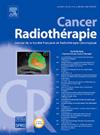Oncological outcomes of patients with muscle-invasive bladder cancer treated with trimodal strategy: A French multicentric study
IF 1.4
4区 医学
Q4 ONCOLOGY
引用次数: 0
Abstract
Purpose
Trimodal therapy, an organ-sparing alternative, may be proposed for selected patients with muscle-invasive bladder cancer instead of radical cystectomy. In this multicentre retrospective study, we aimed to assess the oncological outcomes of patients who had trimodal therapy for a muscle-invasive bladder cancer.
Materials and methods
Seventy-three patients from four centres treated who had trimodal therapy (maximal transurethral resection of bladder tumour and concomitant chemoradiotherapy) for localized muscle-invasive bladder cancer were included. Patients meeting the optimal trimodal therapy eligibility criteria as per the European Association of Urology guidelines were identified. Overall survival, recurrence-free survival and cancer-specific survival were assessed using the Kaplan–Meier method. The cumulative incidence of recurrence was estimated using the Kalbfleisch–Prentice method.
Results
Median overall survival was 27.0 months (95 % confidence interval [CI]: 20.3–58.3 months), 5-years overall-, cancer-specific- and recurrence-free survival rates were 37.5% (95 % CI: 25.5–49.5 %), 60 % (95 % CI: 48.3–72.0 %), and 17.9 % (95 % CI: 9.3–28.8 %), respectively. There was no significant difference in 5-year overall survival and recurrence-free survival between the trimodal therapy-eligible and non-eligible patients (hazard ratio [HR]: 1.38, P = 0.30 and HR: 0.96, P = 0.90, respectively). The univariate analysis did not reveal any significant prognostic factors associated with recurrence-free or overall survival.
Conclusion
Trimodal therapy offers encouraging specific survival, the prognosis remains poor. Our study highlights the low number and high frailty of patients to whom trimodal therapy is offered in clinical practice.
采用三联疗法治疗肌肉浸润性膀胱癌患者的肿瘤疗效:一项法国多中心研究。
目的:对于特定的肌层浸润性膀胱癌患者,三联疗法是一种保留器官的替代疗法,可替代根治性膀胱切除术。在这项多中心回顾性研究中,我们旨在评估接受三联疗法治疗的肌层浸润性膀胱癌患者的肿瘤治疗效果:研究纳入了来自四个中心的73名接受三联疗法(最大限度经尿道膀胱肿瘤切除术和同步放化疗)治疗的局部肌层浸润性膀胱癌患者。根据欧洲泌尿外科协会指南,确定了符合最佳三联疗法资格标准的患者。采用 Kaplan-Meier 法评估总生存率、无复发生存率和癌症特异性生存率。采用Kalbfleisch-Prentice方法估算复发的累积发生率:中位总生存期为27.0个月(95%置信区间[CI]:20.3-58.3个月),5年总生存率、癌症特异性生存率和无复发生存率分别为37.5%(95% CI:25.5-49.5%)、60%(95% CI:48.3-72.0%)和17.9%(95% CI:9.3-28.8%)。符合三联疗法条件的患者与不符合条件的患者在5年总生存率和无复发生存率方面没有明显差异(危险比[HR]:1.38,P=0.30;HR:0.96,P=0.90)。单变量分析未发现任何与无复发生存期或总生存期相关的重要预后因素:结论:三联疗法提供了令人鼓舞的特异性生存期,但预后仍然不佳。我们的研究凸显了临床实践中接受三联疗法的患者人数少且体质脆弱。
本文章由计算机程序翻译,如有差异,请以英文原文为准。
求助全文
约1分钟内获得全文
求助全文
来源期刊

Cancer Radiotherapie
医学-核医学
CiteScore
2.20
自引率
23.10%
发文量
129
审稿时长
63 days
期刊介绍:
Cancer/radiothérapie se veut d''abord et avant tout un organe francophone de publication des travaux de recherche en radiothérapie. La revue a pour objectif de diffuser les informations majeures sur les travaux de recherche en cancérologie et tout ce qui touche de près ou de loin au traitement du cancer par les radiations : technologie, radiophysique, radiobiologie et radiothérapie clinique.
 求助内容:
求助内容: 应助结果提醒方式:
应助结果提醒方式:


